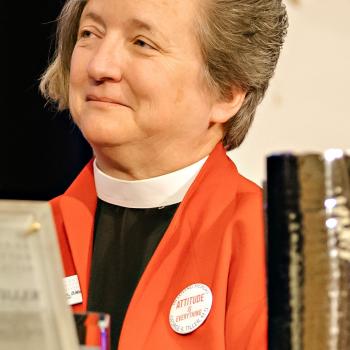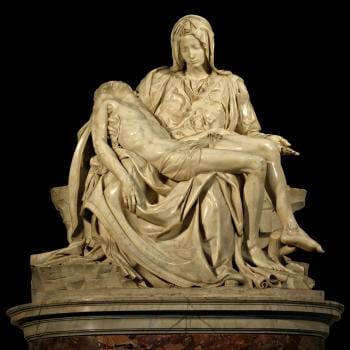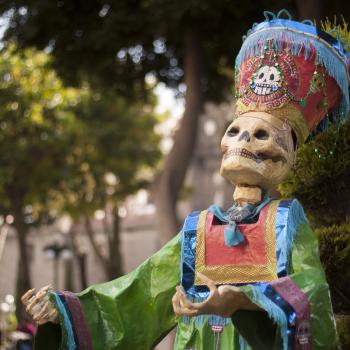 There are two roads the church can take in the wake of the ‘personal ordinariate’ announcement yesterday. See which scenario you think more likely?
There are two roads the church can take in the wake of the ‘personal ordinariate’ announcement yesterday. See which scenario you think more likely?
1. Option No. 1 The Catholic bishops are enthusiastic about this creative new possibility for their dioceses. Experiencing a shortage of good priests they see that the Anglicans are well educated, mature men with long pastoral experience and solid liturgical sense. They immediately appoint a personal ordinary for them and encourage as many as possible to enter into full communion. They don’t have a problem with married men being ordained, and realize it could bring variety, strength and new blood into the presbyterate. Furthermore, they are positive and creative in helping these new priests and their congregations get established financially. Their priests welcome the new men and their families into the presbyterate realizing that they are bringing a whole range of gifts, experience, knowledge and know how to the Catholic Church.
For their part, the Anglicans and Episcopalians see this as a positive move forward. They are able to solve several of their problems at once. They can be rid of the troublesome Anglo Catholics. They can therefore focus on their mission to bring justice and peace to the downtrodden. They can also see the practical benefits: they can cut their clergy numbers because salaries and future pension plans are looking impossible with declining numbers. They can also get rid of some of their surplus buildings. In fact they can choose which ones they hand over to the Anglican Use Catholics. This will ensure that not only the buildings, but all the Catholic paraphrenalia like thuribles and vestments and monstrances will find a new home and that ‘valuable Anglican heritage’ will be continued in a more appropriate way. They embrace this possibility and encourage the Anglo Catholics to go by agreeing to a compensation plan to help them with the transition. This, after all, is the fruit of years of meaningful and profitable ecumenical discussion and at last, painful though it may be, another portion of Christ’s church is unified once more.
Members and clergy of continuing Anglican Churches also jump at the chance to be in full communion with Rome. Their bishops happily lay aside their miters and croziers and go through a period in which they are simply Catholic laymen. Their little congregations or denominations are willingly subsumed into the authority of the new ‘personal ordinary’ and they emerge from the transition as Anglican Use Catholics. Their church and property will now be owned by the ‘personal ordinary’ or the local Catholic diocese, but they won’t mind because at last they are one with the Bishop of Rome which is what they always wanted. Their people will submit happily to having their irregular marriages examined and they will be taught to understand Marian dogmas, Papal infalliblity and accept transubstantiation easily and with open hearts and minds.
2. Option No. 2 The liberal Catholic bishops are horrified at the idea of an influx of conservative ‘misogynistic homophobic’ former Anglicans. They quietly put the project of a ‘personal ordinariate’ on the back burner. Another category, and probably the largest, are the Catholic bishops who simply do not have the competence, imagination or courage to do anything at all with such a radical idea. They don’t understand Protestants. The Anglican Communion is a many headed hydra they have no idea how to wrestle. The idea of married priests is daunting. They don’t have a clue how they would support them financially. The complications of a ‘church within a church’ throws them for a loop. They have so many more important things to think about, so they too put the whole thing on the back burner. There are a few Catholic bishops who see the good side and want to make the personal ordinariate work, but they are voted down by the others, and not able to go it alone, they quietly let the idea drop.
The Anglican and Episcopal hierarchy are privately incensed at Rome’s blatant sheep stealing efforts. It confirms their long held and worst suspicions about Rome. They dig in their heels. They make life as difficult as possible for their Anglo Catholic colleagues who want to leave. They refuse all compensation plans. They resist all attempts for the Anglo Catholics to have their buildings–even if the building is unwanted and the Anglo Catholics offer to buy it. In polite terms (for the Anglicans are always polite) they tell the Anglo Catholics to simply get out and become Catholics if that’s what they want. The Anglo Catholics who are still in the Church of England and Episcopal Church then realize that nothing has been accomplished. They will still have to walk out on their beautiful buildings, their historic endowments, their priviledged place in society, their pension plan and their salary. To be an ‘Anglican Use Catholic’ they will have to start up a little church in a rented store front or someone’s attic. They will have to gather a little eccentric flock of ‘Anglican Use’ folks and start from scratch. Then suddenly they will discover all sorts of reasons why ‘perhaps in the long run it will better to stay in the Church of England after all.’
The leaders of the continuing churches will look at the proposals and come to a rapid conclusion: the Protestant minded will reject Rome’s outstretched hand without a second consideration. They never wanted to be Catholics. The Anglican Church (that is to say their particular continuing church)is already Catholic ‘but Reformed’. The emphasis is on ‘Reformed’. The more Catholic minded will discover that they and their flock will have to have their irregular marriages assessed. Their leaders will have to step down. Rome will appoint a personal ordinary to whom they will need to submit. Their denomination, their property, their cathedrals, yes even their website! will have to close down or be transformed into something new. They will have to use the liturgy approved by Rome. Many of their people will rebel. They will say, “Father, if we had wanted to be Catholic we would have converted long ago.” Faced with rebellion in the ranks, the sacrifice of their position and autonomy they too will find all sorts of reasons why, “Perhaps it is best to watch and wait and see how all this develops. We don’t want to be hasty. I think after all, the status quo is better don’t you? After all, better the devil you know than the devil you don’t.
Which road do you think is more likely?











